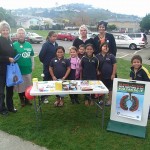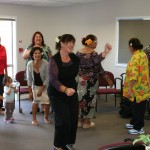




I’ve been thinking… about Sustaining a CSO
Kindra talks about how to sustain a Civil Service Organisation.
By Inspiring Communities’ Kindra Douglas – 18th July 2016
I’ve been Director at Victory Community Centre for 8 years now, since our inception and the almost 3 years leading to it being here. Some days the work does generate the feelings “how do we keep going, when it feels we are swimming against the tide with funding”, and “are we really making any difference?” So what has and does sustain our organisation?
Civil Society Organisations (CSO) are involved in complex relationships – dynamic, changeable, and vulnerable to political and social impacts. So no surprises that the first element of any sound organisation is the people who make up a CSO.
We have been blessed by having really stable, highly professional staff with an appreciation of the strategic relationships to support the vision and mission of our organisation as well as genuine and high capacity for the day to day realities – i.e. not afraid to muck in with whatever it takes. This staffing quality and stability has enabled continuity of care and a sense of genuine relationship building. The first three employees have been here for the duration since we began and now our team is five part time. So recruitment and retention is a big factor in sustainability.
The approach I take as Director is closely supported by a particular philosophical approach with managing the centre. I actively work in terms of staff with the SCARF model. Short version of this model: It articulates our social needs at work, which I believe if met, contribute to stability and sustainability of the staff.
SCARF stands for status; certainty; autonomy; relatedness; fairness.
Check it out here and scroll halfway down to Managing with the Brain in Mind.
If we actively discuss ways to meet these needs, and structure the job descriptions and systems of our work, and our ways of working as individuals and teams accordingly, then these needs will be met. I use this model to do annual appraisals as well, which are a self directed evaluation and then using a scale on each of these needs to determine which need more attention, or less and what will help that to happen. Basically that could be summarised as always playing to people’s strengths; encouraging creative input; being prepared to guide and set clear boundaries, and staying connected to each other’s work and how it contributes to the whole success.
The second big factor for sustainability is financial stability.
I use what is called the “6-7 Key Streams” model. I learned this from Kerri Tilby-Price at an Exult workshop. As a financial manager, all income is coded into 6 or 7 streams (the 7th is membership, and some organisations don’t work on that basis). I code all income and now also all expenditure so that we can track where and what, comes and goes. Using that as a % of all income, it becomes visible where the potential lies to bring better balance into all the streams. Relatively simple, and yet very effective from my experience and creates some clear targets / focus for activity for our organisation.
I am keenly aware that the 3rd main contributor to sustainability is about relationships. A colleague once said “The currency of business is money/profit. The currency of CSO’s is relationship”. Every relationship we have, whether it’s to support us, or for us to support others, contributes to our vision and mission. And every one of them falls into all or part of the continuum:
Partnership – Collaboration – Cooperation – Networking – Co-existence
With some organisations, like our relationship to the school here, we actively work across the whole continuum. Being clear on where on the continuum this piece of work is occurring helps establish the nature of the relationship. It may be that you want to move a relationship from networking, to becoming partners. What will help that happen, and why, are good things to clarify before you invest time and energy.
The last factor that I believe contributes to sustainability is being open to opportunities. Being welcoming, warm, nimble and accessible to people and their contributions, can be game changers on a day.
Being willing in the moment to say “YES” to offers of support or connection, and then figuring out “how and when” to an idea is generally our first response.
So being willing to take a manageable risk given your experience and intuitive sense of how much you can trust a new relationship/connection, can take your organisation into new and exciting opportunities that we might not have considered. This generates creativity, and possibility and keeps hope alive.
For more information, see https://victorycommunitycentre.nz/
Kindra Douglas was Founding Director of Victory Community Centre in 2007 and now works for Inspiring Communities.


